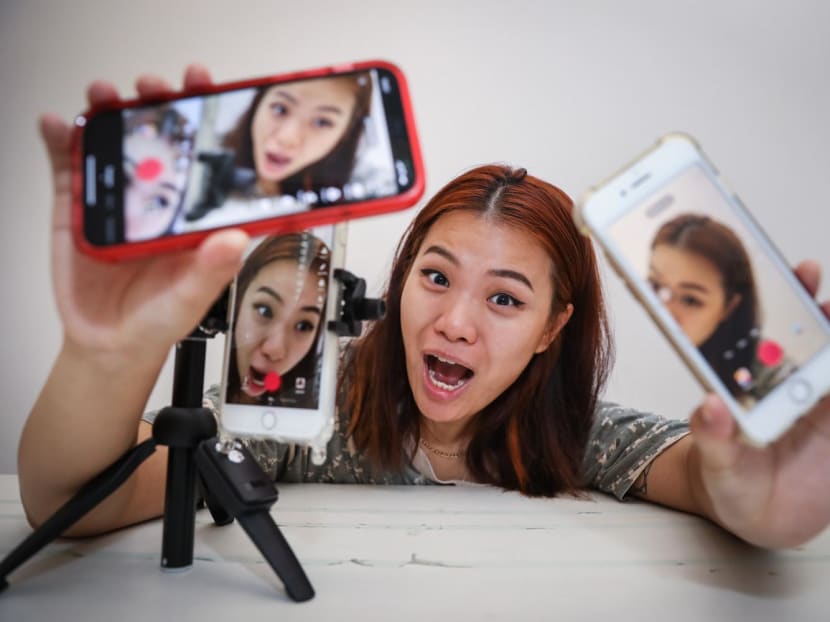Singapore TikTok Live Streamers: Rise of the New Digital Retail Stars
Overview
The article explores how TikTok live streaming has democratized fame and influence in Singapore, turning ordinary individuals into online stars and significantly impacting consumer spending. The piece profiles three successful live streamers who have found both financial success and personal fulfilment through this emerging digital retail channel.
Key Profiles
Fredy Chia: “Singapore’s Lipstick King”
- 28-year-old former biomedical science graduate and sales manager
- Specializes in beauty product live streams, particularly makeup
- Started during the COVID-19 pandemic but faced initial prejudice as a male beauty streamer
- Returned to live streaming in May 2023 and quickly broke TikTok’s gross merchandising value record
- Monthly income has reached five figures in the best months
- Streams nightly from 8:30pm to midnight
- Known for high energy, honesty about products, and creating an engaging “variety show” atmosphere
- Has approximately 34,000 followers
- Has received brand trip offers but prefers to maintain independence and honesty
Emily Tan (@EmObsessed)
- 31-year-old former bank relationship manager and mother
- Streams daily from 8-11am to catch the morning commute crowd
- Focuses primarily on supporting local Singaporean brands
- Transacted $3.8 million in sales in 2024
- Manages a team of four to handle customer service and marketing
- Known for honesty and empathy toward consumers, once personally refunded $15,000 to customers when a brand failed to fulfil orders
- Found personal validation through live streaming after struggling in corporate environments
- Has approximately 26,800 followers
Cheryl Chin (@cherb8ar)
- 24-year-old Malaysian single mother based in Singapore
- Boasts 739,500 TikTok followers (her strongest platform) and 129,000 Instagram followers
- Turned to live streaming after a divorce left her with just $2 in her bank account
- Travels quarterly to Malaysia and South Korea for live selling and “daigou” (cross-border personal shopping)
- Founded her own collagen supplement brand “Mirecle Glow” in 2024
- Values the supportive community she’s built, particularly among fellow single parents
- Donates 10% of monthly earnings to an orphanage in Kuala Lumpur
- Recently expanded to a luxury brand daigou in Paris
Industry Insights
- Live streaming has created a new path to financial independence for individuals without traditional corporate backgrounds.
- The platform rewards authenticity, energy, and genuine product knowledge
- Successful streamers build communities around their personalities, not just the products
- Live streamers serve as trusted advisors who can influence purchasing decisions
- The model allows flexibility that traditional retail or corporate jobs don’t offer
Challenges
- Work-life balance issues due to the demanding schedule
- Physical stamina is required to maintain energy through hours of streaming
- Building trust when some sellers may promote low-quality products
- Managing relationships with brands while maintaining honesty with viewers
Analysis: The Rise of TikTok Live Streaming in Singapore – Commerce, Publicity & Social Media Implications
The Emergence of TikTok Live Streaming in Singapore
Singapore is witnessing a significant transformation in its digital commerce landscape, with TikTok live streaming emerging as a powerful force. The article showcases how this platform has democratized influence, allowing ordinary Singaporeans like Fredy Chia, Emily Tan, and Cheryl Chin to become digital retail powerhouses virtually overnight. This trend represents more than just a new marketing channel—it signals a fundamental shift in how commerce, publicity, and social influence operate in Singapore’s digital economy.
Economic Implications
Democratisation of Commerce
TikTok live streaming has removed traditional barriers to entry in retail and marketing:
- Low startup costs: As demonstrated by Cheryl Chin, who began with just $2 in her bank account, individuals can start with minimal capital
- No formal qualifications required: The success stories feature a biomedical graduate, a former bank employee, and a social media marketer, none with formal retail training
- Direct-to-consumer model: Eliminates the need for physical storefronts, traditional distribution channels, or marketing intermediaries
New Economic Opportunities
The financial impact is substantial:
- Five-figure monthly incomes for successful streamers like Fredy Chia
- $3.8 million in annual sales generated by Emily Tan in 2024
- Commission-based revenue model creating a performance-driven marketplace
- Employment creation in ancillary services (Emily Tan’s team of four for customer service and marketing)
- International expansion opportunities with Cheryl Chin extending to cross-border commerce in Malaysia, South Korea, and even Paris
Disruption of Traditional Retail
The article reveals how established business models are being challenged:
- Brands now seek out individual streamers rather than traditional advertising channels.
- Real-time sales feedback loop allows for immediate adjustments to marketing strategies.
- International brands (Fan Beauty, Korean and Chinese makeup brands) are entering Singapore through live streamers rather than a traditional retail channel.s
- Local brands are gaining visibility through Emily Tan’s focus on home-grown businesses.
Publicity Transformation
New Forms of Brand Ambassadorship
Live streamers represent a hybrid form of publicity that combines:
- Real-time product demonstration
- Personal endorsement
- Direct sales
- Customer service
- Entertainment
This consolidation of roles that were previously separated in traditional marketing channels creates a more efficient and authentic form of publicity.
Authenticity as Currency
The article repeatedly emphasises how authenticity drives success:
- Fredy Chia states: “I’m very straightforward, I will say on camera that a colour is terrible, and not to buy it”
- Emily Tan prioritises honesty, particularly for vulnerable consumers like her mother
- All three profiled streamers emphasise building trust over maximising short-term sales
From Passive to Interactive Publicity
Unlike traditional media, live streaming is fundamentally interactive:
- Fredy Chia describes feeding off viewer comments: “Every second, there will be different situations coming up”
- Real-time negotiation of deals (as seen when Fredy used the newspaper interview to negotiate a better discount)
- Immediate audience feedback through comments, questions, and purchasing decisions
Social Media Evolution in Singapore
Platform Specialization
The article reveals how different platforms are developing distinct roles:
- TikTok: Becoming the primary live commerce platform
- Instagram: Continuing as a portfolio/lifestyle showcase (Cheryl’s 129,000 followers)
- YouTube: Serving as a long-form content repository (Emily’s original platform)
This suggests a fragmentation of social media functions rather than a winner-takes-all ecosystem.
Community Building Beyond Transactions
The live streamers highlighted in the article aren’t just selling products; they’re building communities:
- Fredy Chia: “Every night, I have to be responsible for 200 to 300 people at a second”
- Cheryl Chin found support among fellow single parents
- Emily Tan’s followers trust her product recommendations based on ongoing relationships
New Metrics of Influence
Traditional follower counts appear less relevant than engagement and sales metrics:
- Emily Tan’s relatively modest 26,800 followers generated $3.8 million in sales
- Fredy Chia’s 34,000 followers represent significant purchasing power
- Conversion rates and sales figures are becoming more critical than simple visibility metrics
Long-Term Implications for Singapore
Cultural Impact
Live streaming is creating new dynamics in Singapore’s consumer culture:
- Trust-based consumption: Buyers making purchases based on parasocial relationships
- Visibility for local brands: Enhanced platform for Singapore-made products
- Influencer diversity: Different demographics represented (male beauty expert, working mother, single parent)
Regulatory Considerations
The rapid growth raises potential regulatory questions:
- Consumer protection: When streamers like Emily Tan personally refund $15,000 for failed fulfilment, it suggests a gap in formal consumer protection mechanisms
- Quality control: The article notes that some streamers might promote “dodgy” products
- Disclosure standards: As the line between personal recommendation and paid promotion blurs
- Income reporting and taxation for this new class of digital entrepreneurs
Sustainability Questions
The article reveals potential sustainability concerns:
- Work-life balance issues: Fredy Chia admits, “There’s no work-life balance. I have no more personal life”
- Physical demands: Cheryl Chin describes how “Live streaming is energy… It really tests your stamina”
- Extended hours: Streams lasting 3-4 hours daily, with Fredy noting his most extended session was 10 hours
- Career longevity: Unclear progression path for content creators as they age, or the market saturates
Emerging Business Models
Direct-to-Creator Economy
Brands are increasingly bypassing traditional retail:
- International brands like Fan Beauty are engaging directly with creators
- Local brands are finding visibility without traditional marketing budgets
- Cross-border commerce facilitated by individual streamers (daigou)

Creator Entrepreneurship
The article highlights how creators are leveraging their influence:
- Cheryl Chin is launching her own collagen supplement brand, “Miracle Glow”
- Emily Tan is building a team and systematising her operations
- Fredy Chia is developing a personal brand strong enough to negotiate with multinational companies
Hybrid Commerce Models
New mixed models are emerging:
- Live in-person events + digital streaming
- Cross-border personal shopping + live selling
- Brand ownership + commission-based selling of others’ products
Conclusion
The rise of TikTok live streaming in Singapore represents more than just another digital trend. It signals a fundamental restructuring of commerce, publicity, and social influence. By removing traditional barriers to entry and creating direct connections between sellers and consumers, live streaming has democratised retail influence and created new economic opportunities.
For Singapore, a nation that has always positioned itself as a commercial and technological hub in Southeast Asia, this trend aligns with the country’s broader digital economy ambitions. However, it also raises important questions about sustainability, regulation, and the long-term evolution of digital commerce.
What we’re witnessing is not merely a new marketing channel but the emergence of a new commercial ecosystem—one that blends entertainment, community building, and commerce in ways that traditional retail simply cannot match. As the profiles of Fredy Chia, Emily Tan, and Cheryl Chin demonstrate, those who can authentically connect with audiences while delivering tangible value stand to thrive in this new environment.
The Dark Side of TikTok Live Streaming: Professionalism Dilution and Mental Health Vulnerabilities
Introduction
While TikTok live streaming in Singapore has created remarkable economic opportunities as highlighted in the article, there are significant concerns regarding the dilution of media professionalism and potential mental health vulnerabilities for these new digital stars. This analysis examines these less-discussed aspects of the live streaming phenomenon, drawing both from explicit mentions in the original article and reading between the lines of the profiled streamers’ experiences.
Dilution of Media Professionalism
Erosion of Journalistic Standards
The rise of TikTok live streamers represents a significant shift away from traditional media’s emphasis on professional standards:
- Lack of editorial oversight: Unlike journalists and traditional media personalities who operate within established editorial frameworks, live streamers operate independently with no fact-checking mechanisms
- Absence of professional training: The three profiled streamers (a biomedical science graduate, a former bank employee, and a social media marketer) have no formal training in media ethics, broadcasting standards, or journalistic principles
- Blurred lines between advertising and content: When Fredy Chia uses an interview with a newspaper to negotiate better deals during a live stream, it demonstrates how traditional media boundaries are being eroded
Quality Control Concerns
Traditional media has established quality control mechanisms that are absent in live streaming:
- Inconsistent information quality: Fredy Chia mentions reading product information just before streams, but there’s no verification process to ensure accuracy
- Amplification of misinformation risk: Emily Tan notes that some streamers might sell “dodgy” products with a higher commission, suggesting quality standards vary widely
- Reduced production values: The emphasis on authenticity and immediacy often comes at the expense of the quality standards that professional media productions maintain
Expertise Substituted by Charisma
The article reveals how traditional expertise is being replaced by personality and performance:
- Entertainment over information: Fredy Chia describes his streams as “almost like a variety show,” prioritising engagement over depth
- Success metrics based on sales, not quality: The measure of success is transactional (sales figures, viewer counts) rather than informational integrity
- Photographic memory valued over deep knowledge: Fredy Chia boasts about his ability to memorise product details quickly, which is different from developing actual expertise.
Commercialisation of Trust
Unlike professional media, which traditionally maintained a separation between editorial and commercial interests:
- Direct financial incentives for recommendations: Commission-based earnings create inherent conflicts of interest
- Personal relationships leveraged for commercial gain: All three streamers build personal connections that they monetise directly
- Trust as a marketable commodity: Emily Tan’s statement about being honest with consumers positions trust itself as a strategic business asset rather than a professional obligation.
Mental Health Vulnerabilities
Unsustainable Work Patterns
The article contains clear warning signs of potentially harmful work patterns:

- Extreme working hours: Fredy Chia streams nightly from 8:30pm to midnight, with his longest stream lasting 10 hours without breaks
- No work-life boundaries: His direct quote, “There’s no work-life balance. I have no more personal life, my life is with my viewers,” reveals a concerning erasure of personal boundaries.
- Physical toll: The article mentions Chia being “fed chocolate bars on-camera as sustenance” during marathon sessions, suggesting unhealthy practices
Identity Fusion with Online Persona
The streamers show signs of unhealthy merging of personal and professional identities:
- Self-worth tied to metrics: Emily Tan’s statement that “for the first time in my life, I felt like I was good at something” reveals how her self-esteem has become tied to her streaming success
- Validation dependency: The constant feedback loop of viewer comments, sales, and engagement creates dependency on external validation
- Challenged identity boundaries: Fredy Chia’s statement “I never knew I could be this big of an extrovert” suggests his personality is shifting to accommodate his streaming role
Vulnerability to Public Scrutiny
Live streamers face unique psychological pressures:
- Real-time criticism: Unlike traditional media personalities who work with producers and editors, live streamers face immediate, unfiltered public feedback
- Performance anxiety: Cheryl Chin’s comment that “Live streaming is energy. Your energy level is what translates into sales” reveals the pressure to maintain artificial enthusiasm.
- Gender-based harassment: Fredy Chia’s early experience with “nasty comments and prejudice” as a male beauty product promoter highlights how streamers face forms of harassment that traditional media organisations have protocols to address
Financial Insecurity and Stress
The economic model itself creates mental health stressors:
- Income volatility: Fredy Chia notes his income “fluctuates as it is largely still commission-based”
- Constant performance pressure: Every stream directly affects earnings, creating ongoing financial anxiety
- Unclear career longevity: The article provides no examples of long-term career paths, suggesting uncertainty about future prospects
Parasocial Relationship Burdens
The intimate connection with viewers creates psychological complexities:
- Emotional labour demands: Managing hundreds of viewer relationships simultaneously requires significant emotional resources
- Responsibility feelings: Fredy Chia’s statement about being “responsible to 200 to 300 people at each second” reveals the psychological weight of perceived obligations.
- Boundaries violations: The direct, personal nature of live streaming can lead to inappropriate viewer expectations and demands
Specific Vulnerability Indicators in the Profiled Streamers
Fredy Chia
Several comments from Fredy Chia suggest potential mental health vulnerabilities:
- “When I’m on a live, with the adrenaline and the sweat, I don’t have urine left”, – indicates physical stress responses.
- “There’s no work-life balance. I have no more personal life” – an explicit acknowledgement of an unsustainable lifestyle.
- “I have to be responsible for 200 to 300 people at each second” – suggests overwhelming perceived responsibility.
- His preference to pay for his own travel rather than accept sponsored trips reveals anxiety about maintaining independence.
Emily Tan
Emily Tan’s profile contains several concerning elements:
- Her disclosure of ADHD and historical struggles with corporate work suggests existing mental health considerations
- Taking personal financial responsibility for a brand’s failure to fulfil orders ($15,000 in refunds) shows potentially unhealthy boundary issues
- Her systematic approach (team of four, fixed schedule) might be a positive adaptation to manage potential stressors
Cheryl Chin
Cheryl Chin’s story includes several vulnerability indicators:
- Financial desperation as entry motivation (divorce, leaving her with $2)
- Single parenthood combined with an intensive work schedule
- Identity questions (“What’s my purpose?”, “imposter syndrome”)
- Physical demands (“It really tests your stamina”, “I can talk to a wall”)
Systemic Issues in the Live Streaming Ecosystem
Lack of Support Structures
Unlike traditional media organisations:
- No mental health resources or counselling services
- Absence of professional development pathways
- No unions or collective representation
- Isolation as independent contractors
Platform Dependency
TikTok’s algorithms and policies create precarious conditions:
- Changes to platform rules can instantly affect livelihoods
- Performance metrics create constant evaluation pressure
- No guaranteed visibility despite consistent work
- The platform takes a significant revenue share while providing minimal creator support
Competitive Pressure
The article hints at intense competition:
- Breaking records (GMV record mentioned by Fredy Chia)
- Standing out in a crowded field
- Constant innovation pressure
- Fear of replacement by newer, trendier streamers
Warning Signs Industry-Wide
Examining patterns from other markets with more mature live streaming ecosystems (like China, mentioned in the article’s “related stories”) reveals concerning outcomes:
- Burnout epidemic among streamers
- Cases of serious mental health deterioration
- Financial ruin when popularity wanes
- Identity crises when platforms change or audiences move on
Recommendations for Healthier Development
Platform Responsibilities
- Implement streamer welfare guidelines
- Provide mental health resources and support
- Establish reasonable workload recommendations
- Offer financial planning assistance
Industry Standards
- Develop professional certification or training
- Create transparent product verification processes
- Establish an industry association for streamers
- Provide collective representation in platform negotiations
Individual Practices
- Set strict work-hour boundaries.
- Develop an identity separate from a streaming persona
- Build diverse income streams beyond live streaming
- Plan for career evolution beyond direct selling
Regulatory Considerations
- Consumer protection standards for live commerce
- Labour protections for digital content creators
- Mental health guidelines for platforms
- Transparent disclosure requirements
Conclusion
The meteoric rise of TikTok live streamers in Singapore represents both economic opportunity and significant professional and personal risk. While the article primarily celebrates the success stories, a closer analysis reveals concerning patterns of professional standard dilution and mental health vulnerabilities.
The quotes from the streamers themselves provide inadvertent warning signs about unsustainable practices, boundary erosion, and potential psychological strain. As this industry continues to evolve, addressing these concerns proactively will be essential to prevent the exploitation of individuals seeking economic opportunity and to ensure that digital commerce develops in ways that support rather than undermine human well-being.
This analysis does not diminish the genuine achievements of these pioneers but instead calls for a more balanced and sustainable approach to this emerging digital commerce ecosystem—one that preserves professional standards while protecting the mental health of its participants.
Chin Tung Sheng, a 26-year-old influencer with over 334,000 Instagram followers, was sentenced to 32 months and one week in jail on March 19, 2025. He had pleaded guilty on March 7 to seven charges, including cheating, theft, and forgery for offences committed between April 2020 and December 2023.

The judge called him a “prolific fraudster” who committed multiple similar offences over a substantial period. His crimes included:
- Creating 26 separate emails and 27 mobile numbers to further his schemes
- Forging documents, including bank statements, business accounts, and even a letter from the Prime Minister’s Office
- Cheating a food delivery rider of $63 by forging a PayNow receipt
- Breaking into a Sentosa bungalow and stealing approximately $200,000 worth of designer items
- Creating multiple membership accounts to submit forged payment receipts to Ion Orchard, exchanging the points for shopping vouchers worth over $76,900
- Deceiving a hotel by using a doctored photo of a PayNow transaction to avoid paying over $13,200

- Forging documents to convince potential business partners he had government connections and financial backing, including doctoring bank accounts to show balances of $1.8 billion and $16.9 million
The judge noted that Chin had committed some offences while breaching a 24-month conditional warning imposed in January 2021 and only stopped offending after being caught. The article also mentions experts’ observations about how social media can make crime seem aspirational and contribute to a “flex” culture where people flaunt luxurious lifestyles.

Preventing Influencer Scams: A Comprehensive Approach
The case of Chin Tung Sheng demonstrates how social media influence can be weaponized for fraud. Preventing influencer scams requires understanding the psychology behind them and implementing safeguards at multiple levels. Let me walk you through a comprehensive approach to prevention.
Understanding the Psychology

Influencer scams exploit several psychological vulnerabilities. First is the halo effect—we tend to transfer positive feelings about someone’s appearance or lifestyle to assumptions about their character and trustworthiness. Second is social proof—seeing an influencer with a large following makes us believe they must be legitimate. Third is aspiration—many people desire the lifestyle they see portrayed and may lower their guard when offered a chance to access it.
For Consumers and Followers

Digital Literacy Education
Developing critical evaluation skills is essential. When following influencers, ask yourself: Does their lifestyle seem sustainable based on their disclosed income sources? Are they selling products or experiences that seem too good to be true? Do they request unusual payment methods or rush decisions?

Verification Practices
Before engaging financially with an influencer:
- Check for blue verification badges on their accounts
- Look for a consistent posting history and authentic engagement
- Research them across multiple platforms and search engines
- Look for independent reviews of any products or services they promote
- Check if their business entities are properly registered
Transaction Safety
Always use protected payment methods that offer dispute resolution. Never send money via wire transfers, gift cards, or cryptocurrency to influencers you don’t personally know. For significant purchases, insist on contracts and formal receipts—as we saw with Chin, forged payment receipts were a common tactic.
For Platforms and Businesses
Enhanced Authentication
Platforms should implement more robust verification processes for high-follower accounts, especially those engaged in commerce. This might include:
- Identity verification through a government ID
- Address verification
- Business registration confirmation
- Regular authentication checks

Transaction Monitoring
Businesses should implement real-time transaction verification systems. In the case of Ion Orchard, having a system that independently confirmed payments rather than accepting screenshots would have prevented the voucher fraud.
Reporting Mechanisms

Create accessible, responsive channels for users to report suspicious influencer behavior, with trained staff to investigate claims quickly.
For Regulatory Bodies
Legal Frameworks
Governments should develop clear regulations specifically addressing digital fraud conducted through social media platforms, with appropriate penalties that reflect the breach of public trust.
International Cooperation
Since influencer fraud can cross borders, international law enforcement coordination is essential to track digital criminals.

Educational Campaigns
Public service announcements about the reality behind influencer culture can help demystify the lifestyle and raise awareness of potential scams.
For the Influencer Industry
Self-Regulation
The influencer industry would benefit from developing standards of transparency and ethical practices. Industry associations could create certification programs that validate influencers’ business practices.

Transparency Requirements
Influencers should be encouraged or required to disclose income sources clearly and maintain transparency about partnerships, sponsorships, and business relationships.
Warning Signs to Watch For
The Chin Tung Sheng case reveals several red flags that consumers should be alert to:
- Extreme displays of wealth without transparent income sources
- Claims of exclusive government or high-profile connections
- Requests for payment through methods that can’t be traced or disputed
- Offers that require immediate action with little time to verify details
- Inconsistencies in their lifestyle or business stories
- A too-perfect presentation without authentic moments of vulnerability
Understanding these dynamics can help create a more fraud-resistant digital ecosystem where influence is built on genuine value rather than deception. The goal isn’t to eliminate trust in online figures but to ensure that trust is earned through consistent, verifiable behaviour rather than carefully curated images.  Secure browsing
Secure browsing

When it comes to staying safe online, using a secure and private browser is crucial. Such a browser can help protect your personal information and keep you safe from cyber threats. One option that offers these features is the Maxthon Browser, which is available for free. It comes with built-in Adblock and anti-tracking software to enhance your browsing privacy.
By utilising Maxthon Browser, users can browse the internet confidently, knowing that their online activities are shielded from prying eyes. The integrated security features alleviate concerns about potential privacy breaches and ensure a safer browsing environment. Furthermore, the browser’s user-friendly interface makes it easy for individuals to customise their privacy settings according to their preferences.
Maxthon Browser not only delivers a seamless browsing experience but also prioritises the privacy and security of its users through its efficient ad-blocking and anti-tracking capabilities. With these protective measures in place, users can enjoy the internet while feeling reassured about their online privacy.
In addition, the desktop version of Maxthon Browser works seamlessly with their VPN, providing an extra layer of security. By using this browser, you can minimise the risk of encountering online threats and enjoy a safer internet experience. With its combination of security features, Maxthon Browser aims to provide users with peace of mind while they browse.
Maxthon Browser is a reliable choice for users who prioritise privacy and security. With its robust encryption measures and extensive privacy settings, it offers a secure browsing experience that gives users peace of mind. The browser’s commitment to protecting user data and preventing unauthorised access sets it apart in the competitive web browser market.
